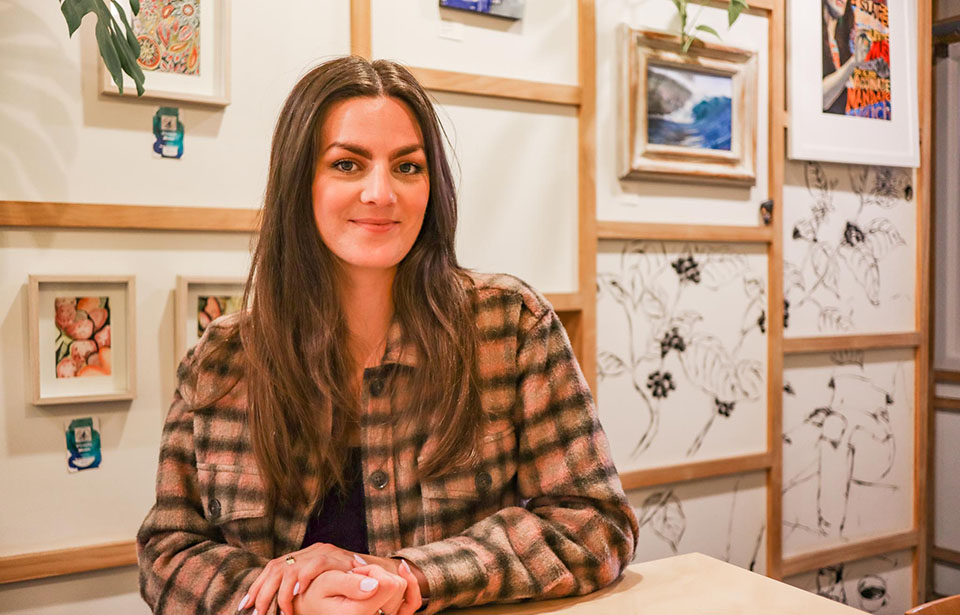Sustainable fashion is pricier – but not as expensive as we think
• August 2, 2023

Sustainable fashion is priced higher, but over time it is cheaper. Photo: Ke-Xin Li
Sustainable fashion pieces may cost us a little more, but experts say when considered over their lifetime, the cost per wear will be lower than non-sustainable products.
As well, the positive impact per wear will be higher. The pricier shirt will be less pricy for planet Earth.
AUT head of Art and Design Professor Amanda Smith says it costs three times more to produce sustainably, thanks to the costs of more authentic design, better working conditions and better materials.
“It's [about] spend more, buy less, keep them longer, and look after them,” says Smith.
“[When] you just buy one, rather than buying five from somewhere that you actually don't care about . . . you get better design. And a good design will last a lot longer.”
A 2021 report by the Boston Consulting Group found many consumers believe sustainable fashion is lower in quality.

Dr Joya Kemper says marketers can help consumers shop sustainably. Photo: supplied
Senior lecturer at University of Canterbury’s business school Dr Joya Kemper says companies could communicate better.
“We, as consumers, usually only look at the cost or sale price. How much do I pay now?
“Marketers need to do a better job of normalising the total cost of a product, demonstrating that their clothing lasts longer – for example advertising cost per use.”
A $50 fast-fashion shirt worn five times is $10 per use, while a $100 sustainable-brand shirt worn 20 times would be $5 per use, she says.
Kemper says the environment and low wages are subsidising unsustainable products, making them cheaper.
Assistant country coordinator for the non-profit organisation Fashion Revolution, Natalia Bertolo, says for financially challenged consumers, sustainable fashion could still be unaffordable even with lower cost per use.
“If you are a single mum with two kids, and you have to dress yourself and those two kids . . . you still want your kids to go to school feeling confident with themselves . . . you want to feel good about yourself too.
“Kids are a good example. They need a lot of clothes. That’s a real conundrum, because you can’t just crucify people for those choices when that’s their reality,” Bertolo says.
Bertolo says she encourages consumers not to trash big fast-fashion brands’ efforts.
“I really like to take my time and see if their efforts are genuine. Because big companies have the potential of the biggest impacts.”
Young people are also finding sustainable fashion expensive, she says.
“I feel [being sustainable] becomes a little bit easier with age. [When I was young] I was experimenting with my style, I didn't want investment pieces.
“And that's the good thing about secondhand fashion. It’s a way for you to spend very little money and still experiment and understand what your style is.”

All Things Considered co-founder Andréa van der Meel. Photo: Ke-Xin Li
Andréa van der Meel, co-founder of sustainable fashion blog All Things Considered, says a good way to buy second hand is through image-search on Google. The results will cover listings on popular second-hand sites such as Designer Wardrobe and Trademe.
“The great thing about pre-loved is that resource has already been used and made by purchasing something second hand over brand new, we are not adding to the demand for new things to be produced."
With overproduction a root cause of wasteful fashion, the European Parliament voted in April in support of measures to tackle it as part of the EU Textile Strategy.
The French Government has recently announced a scheme to help people pay for cloth and shoe repairs.
When reselling loved pieces, van der Meel suggests selling or donating in the right season for the items and to be patient with reselling.
“In terms of donating, always best to do that directly to charity stores. Money that they make from selling that clothing will go back to charitable endeavours.”

Whakatairanga ka tika, whakamaua ngaa mita
AISHA CAMPBELL (NGĀTI RUANUI, NGĀ RAURU, NGĀ RUAHINE, TE ATIAWA, TARANAKI) • October 28, 2025

Supporters hope new council will save Western Springs Speedway
Savannah Lendich Jonkers • October 8, 2025


Whakatairanga ka tika, whakamaua ngaa mita
AISHA CAMPBELL (NGĀTI RUANUI, NGĀ RAURU, NGĀ RUAHINE, TE ATIAWA, TARANAKI) • October 28, 2025

Supporters hope new council will save Western Springs Speedway
Savannah Lendich Jonkers • October 8, 2025
